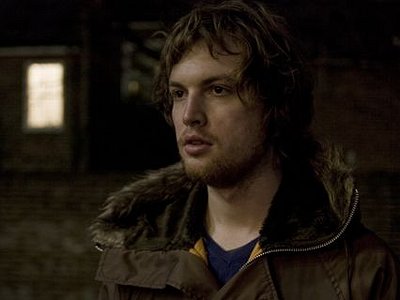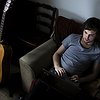Getting emotional
Ben Chatwin is Talvihorros, a musician from London who recently joined the ranks of Denovali's roster. Distinguished as "painstakingly sculpted...forever soaked in black" or "experimental drone gingerly placed atop an ambient base", Chatwin's music has been described in many ways and yet evades genre-labelling. Textura suggests that it "makes more sense to treat Talvihorros music on its own terms, rather than try to fabricate connections between Chatwin’s sound and someone else’s." Chasing the perfect expression of his ideas, Chatwin's music has recently moved away from his signature guitar-based exposition into a broader electronic palette. A London neighbourhood and its personal ghosts was the inspiration for Talvihorros' fifth album, Eaten Alive, available briefly on Chatwin's bandcamp site and as a special edition on Fluid Audio in anticipation of the full release on Denovali in January 2014.
When did you start writing/producing music - and what or who were your early passions and influences?
I think the process of creating my own music began pretty much as soon as I first picked up the guitar as a teenager. Right from the start, I found learning to play the guitar relatively boring and was never interested in technical proficiency. It was using the guitar to communicate something – creating a mood or atmosphere that I found fascinating.
In terms of early passions and influences I think it's fair to say my interest in music was sparked by the guitar bands around when I was in my early teens. I always leaned towards sounds and approaches that were a bit more unconventional. Radiohead's 'OK Computer' opened a door and led into the instrumental work of bands like Mogwai which, in turn, led into the electronic world of Aphex Twin/Autechre. For years after this I consumed anything and everything I could get my hands on, it was all becoming fuel for the fire.
What do you personally consider to be the incisive moments in your artistic work and/or career?
I wouldn't say that there are any specific moments that I can single out in my career – I'm not sure I even consider music making as a 'career' even though it's what I do everyday. It's more something that I do as a way of understanding my position in this world. I am always looking forward to making something better than what I did previously, rather than looking back at what I've already done.
What are currently your main compositional- and production-challenges?
The hunt for minimalism – stripping things back so only the necessary components remain. It's very tough. Far easier to paper over the cracks than to expose them.
What do you usually start with when working on a new piece?
An idea is probably the best place to start. It's nice when an idea strikes to allow time to explore it and try out different ways to approach it before committing it to tape - I try not to rush things. I find that as soon as I start recording and producing an idea it quickly moves away from what I initially conceived into something else entirely. I always try and get as close as I can to the initial idea but it seems like it might be an impossible task.
How strictly do you separate improvising and composing?
Improvisation is extremely important in the way I compose so I guess I don't really see there being much of a separation at all. I've found that I need to separate the creative side (improvising and recording ideas) from the technical side (producing, mixing etc.). To do either well, I need to absorb myself in just one of those tasks. Trying to do both at the same time results in doing neither successfully.
How do you see the relationship between sound, space and composition?
I would consider music to be a physical landscape that can be controlled through composition. I personally try to create something which has emotional impact and that is my primary goal – so I think that the relationship between the three is somewhat irrelevant if I can't achieve some sort of emotional response to the music.
Do you feel it important that an audience is able to deduct the processes and ideas behind a work purely on the basis of the music? If so, how do you make them transparent?
I think an emotional and/or physical response is far more important in an audience's experience or appreciation of the music. If there needs to be an understanding of the technical processes behind the music for it to be understood the music is failing.
In how much, do you feel, are creative decisions shaped by cultural differences – and in how much, vice versa, is the perception of sound influenced by cultural differences?
This is a really difficult question to answer – I think, as someone who tries to make music in quite an honest and organic manner, it's impossible to gauge where exactly the music comes from. I have spent most of my life absorbing culture in various forms and I'm sure it's all inside me somewhere - informing the decisions I make as a composer. But, then no more so than the environment I live in and the relationships I have. They all help to shape the person that I am.






